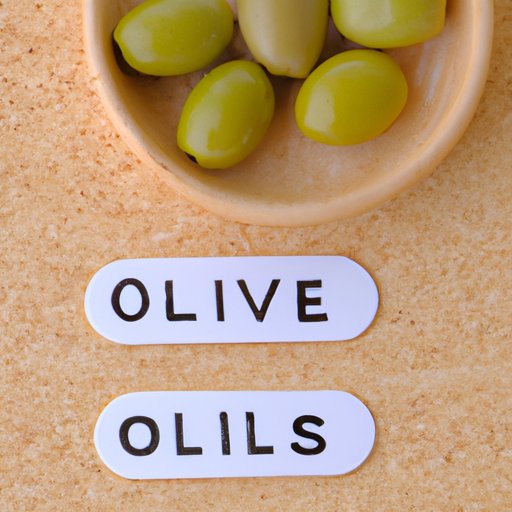
I. Introduction
Olives are a staple of Mediterranean cuisine and are widely considered healthy due to their high nutritional value. They are known for their distinct flavor and make a great addition to salads, dips, and pizzas. However, many people wonder if consuming too many olives can have adverse effects on their health. In this article, we’ll explore the potential risks and benefits of consuming olives and how much you should eat to promote a balanced diet.
II. Health Benefits of Olives
Olives are packed with nutrients and a rich source of healthy fats, antioxidants, and minerals. They contain monounsaturated and polyunsaturated fats, which are known to promote good heart health and reduce the risk of heart disease and stroke. They are also high in vitamin E, which helps to protect your skin from damage caused by harmful free radicals.
Olives have also been found to reduce inflammation throughout the body, thanks to the presence of high levels of antioxidants, such as polyphenols and flavonoids. Polyphenols have been shown to reduce the risk of chronic diseases like cancer, Alzheimer’s disease, and type 2 diabetes.
III. The Risks of Overindulging in Olives
While olives are considered a healthy food, consuming too many can have some risks associated with it. Olives are high in sodium, which can lead to high blood pressure and other heart problems when consumed in large quantities. They are also high in fat, and excess consumption can lead to weight gain and increased cholesterol levels, which can cause problems with heart health and other chronic diseases.
Olives contain a compound called tyramine, which can cause headaches or migraines in some people if consumed in large amounts. They also contain oxalates, which are known to cause kidney stones in people who are prone to developing them.
IV. Finding a Balance: How Many Olives Should You Eat Each Day?
It’s recommended to consume no more than seven to ten olives per day to avoid the potential risks associated with excess intake. However, the precise amount you should consume may vary based on your individual needs and lifestyle factors. For example, a highly active person may require more olives than someone who leads a sedentary lifestyle.
You can regulate your olive intake by choosing varieties that are low in sodium, draining them well before consumption, and eating them in moderation. You can also substitute other foods for olives to avoid consuming excess fat, sodium, or oxalates. If you are worried about the health risks of consuming olives, it’s best to consult a nutritionist or a healthcare professional.
V. Alternatives to Olives: Similar Flavors with Lower Fat & Calorie Content
If you are concerned about the calorie and fat content in olives or are looking for some new flavors to incorporate into your diet, consider alternatives such as roasted red peppers, sun-dried tomatoes, or pickled vegetables. These foods are flavorful and low in fat and calories compared to olives, yet provide a similar flavor profile in recipes or as snacks.
VI. The Impact of Olives on Your Digestive System
Olives have been known to offer some digestive benefits because of their high fiber content. However, consuming too many of them can lead to digestive problems, such as bloating, gas, and indigestion. If you have digestive issues, it may be best to avoid eating olives in large quantities. Opt for smaller, more frequent servings to see how your body reacts to them. If you still experience digestive issues when eating olives in moderation, consider speaking with a healthcare professional.
VII. Delicious Recipes to Satisfy Your Olive Cravings Without Overdoing It
If you enjoy eating olives but want to ensure that you are consuming them in moderation, consider incorporating them into some healthy recipes. Below are some easy recipes that include olives in moderation.
- Greek salad with feta, cucumber, cherry tomatoes, and olives
- Mediterranean veggie wrap with hummus, roasted vegetables, and a sprinkle of olives
- Vegetarian quinoa and olive stuffed bell peppers
- Roasted chicken thighs with olives and lemon
- Zucchini noodles with olive pesto and cherry tomatoes
VIII. Conclusion
Olives are delicious and nutritious, and incorporating them into your diet can have numerous health benefits. Eating them in moderation can offer all of these benefits without posing any potential risks. Remember, the key to a healthy diet is balance, so consume olives and other foods in moderation to ensure that you’re getting all the nutrients you need without the risk of adverse health effects.
If you are unsure about how many olives are right for you or if you experience any symptoms related to overindulging in olives, speak with your healthcare provider or a registered dietician for personalized advice.





